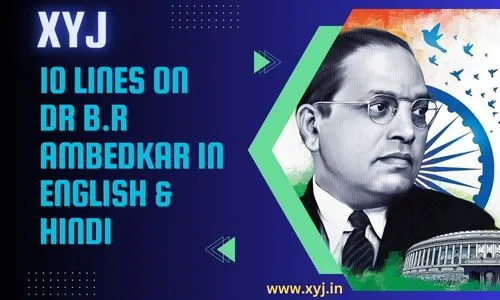Dr. B.R. Ambedkar is well known as Babasaheb Ambedkar, who is the father of Indian constitution and modern India and today we have shared the 10 lines on Dr. B.R. Ambedkar in English and Hindi for all Indians. He was a prominent Indian jurist, social reformer, and politician.
10 Lines in English on Dr. B.R. Ambedkar
- B.R. Ambedkar was born on April 14, 1891, in Maun, Central Provinces, British India (now in Madhya Pradesh, India). He belonged to the Dalit community, formerly known as “untouchables,” and dedicated his life to fighting for their rights and social equality.
- Ambedkar played a pivotal role in drafting the Indian Constitution and is often referred to as the “Architect of the Indian Constitution.”
- He fought against discrimination and untouchability and advocated for the rights of marginalized sections of society, including Dalits and women.
- Ambedkar was the chairman of the drafting committee of the Constituent Assembly and played a crucial role in shaping the democratic principles of modern India.
- He campaign for the abolition of the caste system, untouchability, and the promotion of education as a means of empowerment for marginalized communities.
- Ambedkar was the first law minister of independent India and held various other important positions in the government.
- He believed in the power of education and encouraged Dalits to pursue higher education and knowledge as a means of empowerment and social upliftment.
- Ambedkar converted to Buddhism along with millions of his followers, seeking a path of equality and liberation from the oppressive caste system.
- His tireless efforts for social justice and equality have left an indelible impact on Indian society, and he is widely revered as a champion of human rights and social reform
बी.आर.अम्बेडकर पर 10 वाक्य हिंदी में
1. बी. आर. अम्बेडकर, जिनका जन्म 14 अप्रैल, 1891 को हुआ था, एक प्रमुख भारतीय न्यायविद्, अर्थशास्त्री और समाज सुधारक थे।
2. उन्होंने भारतीय संविधान का मसौदा तैयार करने में महत्वपूर्ण भूमिका निभाई और उन्हें भारतीय संविधान का वास्तुकार माना जाता है।
3. अम्बेडकर ने सामाजिक भेदभाव और असमानता, विशेषकर जाति व्यवस्था के खिलाफ अथक संघर्ष किया।
4. उन्होंने दलितों, महिलाओं और मजदूरों सहित हाशिए पर मौजूद समुदायों के अधिकारों और उत्थान की वकालत की।
5. अम्बेडकर शिक्षा की शक्ति में विश्वास करते थे और उन्होंने सभी के लिए समान शैक्षिक अवसरों को बढ़ावा देने की दिशा में काम किया।
6. उन्होंने अछूतों के सामने आने वाले सामाजिक मुद्दों के समाधान के लिए बहिष्कृत हितकारिणी सभा की स्थापना की।
7. आजादी के बाद अंबेडकर ने भारत के पहले कानून और न्याय मंत्री के रूप में कार्य किया।
8. 1956 में उनके बौद्ध धर्म में परिवर्तन ने कई दलितों को जाति-आधारित भेदभाव से मुक्ति के साधन के रूप में इस धर्म को अपनाने के लिए प्रेरित किया।
9. वह लाखों लोगों के लिए एक आदर्श और आशा की किरण बने हुए हैं, जो भेदभाव के खिलाफ संघर्ष और समान अधिकारों की खोज का प्रतीक हैं।
10. 6 दिसंबर, 1956 को उनका निधन हो गया, लेकिन उनकी विरासत लचीलेपन, समानता और सामाजिक न्याय के प्रतीक के रूप में जीवित है।
